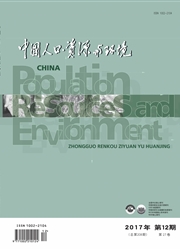

 中文摘要:
中文摘要:
作为一种重要的经济杠杆,能源价格对缀济的影响是多方西的。它不仅可以通过经济总量、产业结构、能源效率等变量最终对能耗乃至碳排放产生影响,同时还会对物价水串产生作用。因此,在利用价格杠杆引导节能减排时要充分考虑到成本和收益的关系,尤其是物价体系的承受能力。有鉴于此。在充分考虑能源价格变动可能引发通货膨胀的条件下,以1978—2013年相关数据为样本,计算了样本区间内我国的碳排放总量;并通过构建单变量、整组变量和联立方程组模型发现:考虑能源价格的调节作用时,经济总量对碳排放的技动效应从0.687降低至0.529;能源价格通过产弛结构产生了0.611的碳抑制效应,但难以通过对能源效率的SI导对碳排放产生抑制。进一步通过整组变量研究发现。考虑经济总避、产业结构、能源效率的共同作用时,整组变量对碳排放的拉动明显降低,能源价格杠杆对碳减排的作用有显著提高。考虑到价格调节秘系统变量交互影响时,产业结构优化带来的碳抑制效应被加大,作用为0.453;此外,能源效率的提升带来了0.398碳抑制效应,同样优于仅考虑价格调节时的0.071。总体上看,能源价格杠杆放大了相关路径的减排效果,但系统中的碳抑制效应还不足以抵补碳拉动效应的事实也表明。能源价格杠杆的作用还尚未充分发挥。基于此,要在究分考虑经济承受能力的基础上。继续深入推进能源价格市场化,同时还簧兼顾结构调整、技术进步的作用。这个过程中,不仅要关注价格手段与各种路径的协调。价格政策与货箍、财政等其他调控手段的协调配合;同时还要兼顾经济效益和环境效应,充分考虑价格杠杆发挥减排作用时的外部成本。
 英文摘要:
英文摘要:
As an important economic lever, energy price has muhifaceted impacts on the economy. It affects not only energy consumption and carbon emission through variables such as the economic aggregate, the industrial structure, and energy efficiency etc. but also the price level. Thus, costs and benefits, especially the tolerance of the price system should be considered when guide energy conservation and emission reduction through price leverage. This paper gives full consideration to potential inflation caused by the change of energy price and calculates the total carbon emission in China based on the sample period 1978 -2013. And by constructing single variable model, the integrated variables model, and the simultaneous equations model, we find that when taking the regulatory effect of energy price into consideration, the pulling effect of the economic aggregate on carbon emission decreases from 0. 687 1 to 0. 528 6, and energy price induces 0. 611 1 carbon depressing effect by industrial structure; however, it is hard for energy price to reduce carbon emission through energy efficiency. The integrated variables model further shows that pulling effect of integrated variables on carbon emission decreases significantly and the effect of price lever on carbon emission reduction improves greatly. When considering regulatory effect of price lever and the interaction among systematic variables, depression effect of industrial structure optimization on carbon emission is amplified to 0. 452 5. In addition, depressing effect of energy efficiency improvement on carbon emission is 0. 397 7 which is greater than 0.070 6 when only price regulation is considered. In general, energy price leverage magnifies the emission reduction effect of related paths. However, the fact that the carbon depressing effect in the system is not big enough to offset the carbon pulling effect indicates that energy price hasn't fully played its role as a lever. Therefore, the government should gradually promote the market-oriented reform of energy pric
 同期刊论文项目
同期刊论文项目
 同项目期刊论文
同项目期刊论文
 期刊信息
期刊信息
